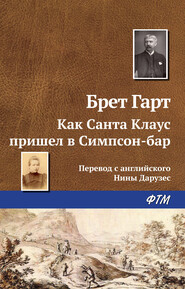По всем вопросам обращайтесь на: info@litportal.ru
(©) 2003-2024.
✖
Gabriel Conroy
Автор
Год написания книги
2017
Настройки чтения
Размер шрифта
Высота строк
Поля
"Oh, it's no use, my dear, positively – no use. He's married. These phenomena always get married. No, I didn't see him in a circus, Mr. Dumphy, nor in a menagerie, Mr. Dyce, but in a girl's school!"
Everybody stared; a few laughed as if this were an amusing introduction to some possible joke from Miss Rosey.
"I was visiting an old schoolmate at Madame Eclair's Pension at Sacramento; he was taking his little sister to the same school," she went on, coolly, "so he told me. I love my love with a G, for he is Guileless and Gentle. His name is Gabriel, and he lives in a Gulch."
"Our friend the superintendent – I'm blessed," said Dyce, looking at Dumphy.
"Yes; but not so very guileless," said Pilcher, "eh, Dyce?"
The gentlemen laughed; the ladies looked at each other and then at Miss Ringround. That fearless young woman was equal to the occasion.
"What have you got against my giant? Out with it!"
"Oh, nothing," said Mr. Pilcher; "only your guileless, simple friend has played the sharpest game on record in Montgomery Street."
"Go on!" said Miss Rosey.
"Shall I?" asked Pilcher of Dumphy.
Dumphy laughed his short laugh. "Go on."
Thus supported, Mr. Pilcher assumed the ease of a graceful raconteur. "Miss Rosey's guileless friend, ladies and gentlemen, is the superintendent and shareholder in a certain valuable silver mine in which Dumphy is largely represented. Being about to leave the country, and anxious to realise on his stock, he contracted for the sale of a hundred shares at $1000 each, with our friend Mr. Dyce, the stocks to be delivered on a certain date – ten days ago. Instead of the stock, that day comes a letter from Conroy – a wonderful piece of art – simple, ill-spelled, and unbusiness-like, saying, that in consequence of recent disappointment in the character and extent of the lead, he shall not hold Dyce to his contract, but will release him. Dyce, who has already sold that identical stock at a pretty profit, rushes off to Dumphy's broker, and finds two hundred shares held at $1200. Dyce smells a large-sized rat, writes that he shall hold Gabriel to the performance of his contract, makes him hand over the stock, delivers it in time, and then loads up again with the broker's 200 at $1200 for a rise. That rise don't come – won't come – for that sale was Gabriel's too– as Dumphy can tell you. There's guilelessness! There's simplicity! And it cleared a hundred thousand by the operation."
Of the party none laughed more heartily than Arthur Poinsett. Without analysing his feelings he was conscious of being greatly relieved by this positive evidence of Gabriel's shrewdness. And when Mrs. Sepulvida touched his elbow, and asked if this were not the squatter who held the forged grant, Arthur, without being conscious of any special meanness, could not help replying with unnecessary significance that it was.
"I believe the whole dreadful story that Donna Dolores told me," said she, "how he married the woman who personated his sister, and all that – the deceitful wretch."
"I've got that letter here," continued Mr. Pilcher, drawing from his pocket a folded piece of letter paper. "It's a curiosity. If you'd like to see the documentary evidence of your friend's guilelessness, here it is," he added, turning to Miss Ringround.
Miss Rosey took the paper defiantly, and unfolded it, as the others gathered round her, Mr. Dumphy availing himself of that opportunity to lean familiarly over the arm of her chair. The letter was written with that timid, uncertain ink, peculiar to the illiterate effort, and suggestive of an occasional sucking of the pen in intervals of abstraction or difficult composition. Saving that characteristic, it is reproduced literally below: —
"1, Hoss Gulch, Argus the 10th.
"Dear Sir, – On acount of thar heving ben bad Luck in the Leed witch has droped, I rite thes few lins hopping you air Well. I have to say we are disapinted in the Leed, it is not wut we thought it was witch is wy I rite thes few lins. now sir purheps you ixpict me to go on with our contrak, and furniss you with 100 shars at 1 Thousin dolls pur shar. It issint wuth no 1 Thousin dols pur shar, far frummit. No sir, it issint, witch is wy I rite you thes few lins, and it Woddent be Rite nor squar for me to tak it. This is to let you off Mister Dyce, and hopin it ant no trubbil to ye, fur I shuddint sell atal things lookin this bad it not bein rite nor squar, and hevin' tor up the contrak atween you and me. So no more at pressen from yours respectfuly. G. Conroy.
"P.S. – You might mind my sayin to you about my sister witch is loss sens 1849. If you happind to com acrost any Traks of hers, me bein' away, you can send the sam to me in Care of Wels Farko & Co., New York Citty, witch is a grate favor and will be pade sure. G. C."
"I don't care what you say, that's an honest letter," said Miss Rosey, with a certain decision of character new to the experience of her friends, "as honest and simple as ever was written. You can bet your pile on that."
No one spoke, but the smile of patronising superiority and chivalrous toleration was exchanged by all the gentlemen except Poinsett. Mr. Dumphy added to his smile his short characteristic bark. At the reference to the writer's sister, Mrs. Sepulvida shrugged her pretty shoulders and looked doubtingly at Poinsett. But to her great astonishment that gentleman reached across the table, took the letter, and having glanced over it, said positively, "You are right, Miss Rosey, it is genuine."
It was characteristic of Poinsett's inconsistency that this statement was as sincere as his previous assent to the popular suspicion. When he took the letter in his hand, he at once detected the evident sincerity of its writer, and as quickly recognised the quaint honesty and simple nature of the man he had known. It was Gabriel Conroy, all over. More than that, he even recalled an odd memory of Grace in this frank directness and utter unselfishness of the brother who so plainly had never forgotten her. That all this might be even reconcilable with the fact of his marriage to the woman who had personated the sister, Arthur easily comprehended. But that it was his own duty, after he had impugned Gabriel's character, to make any personal effort to clear it, was not so plain. Nevertheless, he did not answer Mrs. Sepulvida's look, but walked gravely to the window, and looked out upon the sea, Mr. Dumphy, who, with the instincts of jealousy, saw in Poinsett's remark only a desire to ingratiate himself with Miss Rosey, was quick to follow his lead.
"It's a clear case of quien sabe anyway," he said to the young lady, "and maybe you're right. Joe, pass the champagne."
Dyce and Pilcher looked up inquiringly at their leader, who glanced meaningly towards the open-mouthed Mr. Raynor, whose astonishment at this sudden change in public sentiment was unbounded.
"But look here," said that gentleman, "bless my soul! if this letter is genuine, your friends here – these gentlemen – have lost a hundred thousand dollars! Don't you see? If this news is true, and this man's information is correct, the stock really isn't worth" —
He was interrupted by a laugh from Messrs. Dyce and Pilcher.
"That's so. It would be a devilish good thing on Dyce!" said the latter, good-humouredly. "And as I'm in myself about as much again, I reckon I should take the joke about as well as he."
"But," continued the mystified Mr. Raynor, "do you really mean to say that you have any idea this news is true?"
"Yes," responded Pilcher, coolly.
"Yes," echoed Dyce, with equal serenity.
"You do?"
"We do."
The astonished tourist looked from the one to the other with undisguised wonder and admiration, and then turned to his wife. Had she heard it? Did she fully comprehend that here were men accepting and considering an actual and present loss of nearly a quarter of a million of dollars, as quietly and indifferently as if it were a postage stamp! What superb coolness! What magnificent indifference! What supreme and royal confidence in their own resources. Was this not a country of gods? All of which was delivered in a voice that, although pitched to the key of matrimonial confidence, was still entirely audible to the gods themselves.
"Yes, gentlemen," continued Pilcher; "it's the fortune of war. T'other man's turn to-day, ours to-morrow. Can't afford time to be sorry in this climate. A man's born again here every day. Move along and pass the bottle."
What was that?
Nothing, apparently, but a rattling of windows and shaking of the glasses – the effect of a passing carriage or children running on the piazza without. But why had they all risen with a common instinct, and with faces bloodless and eyes fixed in horrible expectancy? These were the questions which Mr. and Mrs. Raynor asked themselves hurriedly, unconscious of danger, yet with a vague sense of alarm at the terror so plainly marked upon the countenances of these strange, self-poised people, who, a moment before, had seemed the incarnation of reckless self-confidence, and inaccessible to the ordinary annoyances of mortals. And why were these other pleasure-seekers rushing by the windows, and was not that a lady fainting in the hall? Arthur was the first to speak and tacitly answer the unasked question.
"It was from east to west," he said, with a coolness that he felt was affected, and a smile that he knew was not mirthful. "It's over now, I think." He turned to Mrs. Sepulvida, who was very white. "You are not frightened? Surely this is nothing new to you? Let me help you to a glass of wine."
Mrs. Sepulvida took it with a hysterical little laugh. Mrs. Raynor, who was now conscious of a slight feeling of nausea, did not object to the same courtesy from Mr. Pilcher, whose hand shook visibly as he lifted the champagne. Mr. Dumphy returned from the doorway, in which, to his own and everybody's surprise, he was found standing, and took his place at Miss Rosey's side. The young woman was first to recover her reckless hilarity.
"It was a judgment on you for slandering Nature's noblest specimen," she said, shaking her finger at the capitalist.
Mr. Rollingstone, who had returned to the head of his table, laughed.
"But what was it?" gasped Mr. Raynor, making himself at last heard above the somewhat pronounced gaiety of the party.
"An earthquake," said Arthur, quietly.
CHAPTER IV.
MR. DUMPHY HAS NEWS OF A DOMESTIC CHARACTER
"An earthquake!" echoed Mr. Rollingstone, cheerfully, to his guests; "now you've had about everything we have to show. Don't be alarmed, madam," he continued to Mrs. Raynor, who was beginning to show symptoms of hysteria, "nobody ever was hurt by 'em."
"In two hundred years there hasn't been as many persons killed by earthquakes in California as are struck by lightning on your coast in a single summer," said Mr. Dumphy.
"Never have 'em any stronger than this," said Mr. Pilcher, with a comforting suggestion on there being an absolute limitation of Nature's freaks on the Pacific coast.
"Over in a minute, as you see," said Mr. Dumphy, "and – hello! what's that?"
In a moment they were on their feet, pale and breathless again. This time Mr. Raynor and his wife among the number. But it was only a carriage – driving away.
"Let us adjourn to the piazza," said Mr. Dumphy, offering his arm to Mrs. Raynor with the air of having risen solely for that purpose.

















